What is a Sage 100 Developer?
A Sage 100 developer is a technical specialist with deep expertise in customizing, enhancing, and integrating the Sage 100 ERP platform to meet unique business requirements. These developers combine knowledge of Sage software development tools with programming expertise to create solutions that extend far beyond the original software capabilities.
Key Differences from Standard Consultants
Unlike regular ERP consultants who focus on implementation and training, certified developers working with Sage 100 possess the ability to directly modify and enhance the underlying system architecture. They can access source code, create custom modules, and develop integrations that standard consultants simply cannot provide.
The most significant distinction lies in certification and authorization. Master developer certification requires meeting the same stringent requirements that Sage software applies to its internal development teams. This ensures they can deliver enterprise-grade solutions while maintaining system integrity and security protocols that protect your business data.
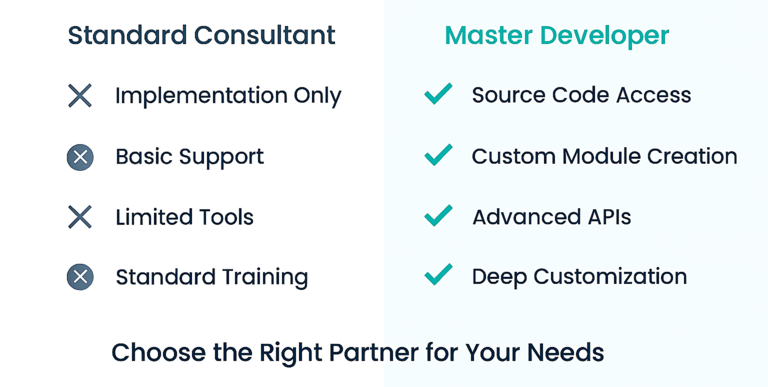
Primary Responsibilities and Capabilities
Professional Sage 100 developers handle a comprehensive range of customization tasks that transform how your business operates:
Custom Module Development: Creating entirely new functions and modules tailored to specific industry needs, from specialized inventory tracking to unique manufacturing processes.
System Integration: Connecting Sage 100 with third-party platforms including CRM systems like Salesforce, freight management solutions, e-commerce platforms, and cloud based platform services.
Process Automation: Streamlining workflows through automated data exchange, eliminating manual processes that consume valuable staff time.
Enhanced Reporting: Developing custom reports and analytics dashboards that provide deeper business insights than standard Sage 100 reports.
Data Migration and Management: Safely transferring and transforming data from legacy systems while maintaining data integrity throughout the process.
Understanding Master Developer Certification
The master developer certification represents the pinnacle of technical recognition within the Sage ecosystem. This prestigious designation is held by only a select group of partners who have demonstrated exceptional expertise and commitment to the platform.
Stringent Requirements and Standards
Achieving master developer status involves meeting stringent requirements across multiple technical and business domains. Candidates must prove their expertise in:
- Advanced programming methodologies and best practices for Sage 100 development
- Comprehensive understanding of Sage 100 architecture, data structures, and system tables
- Security protocols and compliance requirements for protecting sensitive business data
- Quality assurance procedures that ensure reliable, bug-free customizations
- Documentation standards that facilitate ongoing support and future enhancements
Since the program's inception in 1989, only select Sage Partners have successfully achieved and maintained this certification, making it an integral part of the Sage development community.
Exclusive Benefits and Access
Master developer certification provides exclusive access to resources unavailable to standard partners:
Source Code Access: Direct access to Sage 100 source code enables deep-level customizations that seamlessly integrate with core system functions.
Advanced Development Tools: Official Sage software development kits, specialized APIs, and proprietary tools for creating robust enhancements.
Priority Support Channels: Direct access to Sage's technical support teams and early notification of platform changes that might affect custom development.
Upgrade-Safe Development: The ability to create enhancements using methods that ensure compatibility with future Sage 100 updates, protecting your investment.
Companies like Kissinger Associates have maintained master developer status continuously since the program's early days, providing clients with unmatched access to advanced development capabilities.
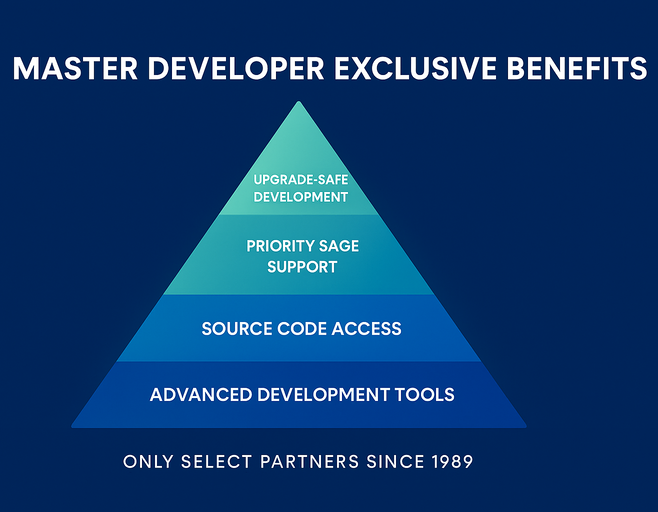
Custom Development Services That Drive Results
Sage 100 custom development services encompass a wide range of enhancements that extend the platform's core functionality. With hundreds of available enhancements and the ability to create bespoke solutions, certified developers can address virtually any business requirement you might have.
Popular Sage 100 Enhancements
The most requested customizations address common business challenges across multiple industries:
Multi-Company Financial Management For businesses operating multiple entities, custom development can streamline consolidated reporting, automate inter-company transactions, and provide real-time visibility across all operations. Companies typically achieve 75% faster month-end closes with properly implemented multi-company solutions.
Advanced Inventory and Warehouse Management Multi-bin warehousing capabilities, lot tracking, and advanced fulfillment logic help businesses improve inventory accuracy by 30% or more. Custom barcode integration and mobile warehouse solutions further enhance operational efficiency.
Service Center and Warranty Management For companies providing repair services or managing warranties, custom service center modules track repair orders, manage warranty claims, and provide complete customer service history—all integrated with your Sage 100 system.
Electronic Reporting and Compliance Automate regulatory compliance with custom electronic reporting solutions. Whether you need specialized tax reporting, industry-specific compliance documents, or automated government filings, developers can create solutions that save time and reduce errors.
Manufacturing Process Enhancements Custom manufacturing modules address specific production needs, from advanced bill of materials management to shop floor data collection and quality control tracking.
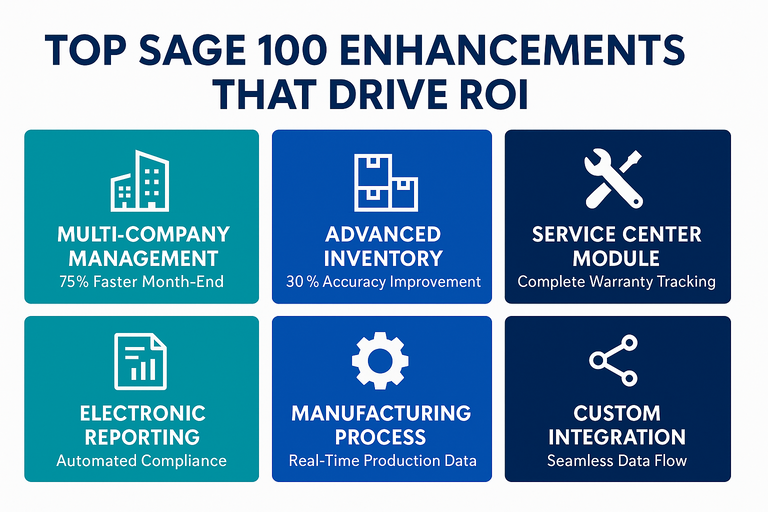
Integration Capabilities
Modern businesses require their Sage 100 system to communicate seamlessly with other technology platforms. Master developers create integrations that connect your ERP with:
CRM Platform Integration: Unify customer data between Sage 100 and Salesforce, Microsoft Dynamics CRM, or other platforms. Eliminate duplicate data entry while providing sales teams with real-time access to customer financial information.
E-commerce System Connections: Real-time inventory synchronization, automated order import, and customer account management between Sage 100 and platforms like Shopify, BigCommerce, or WooCommerce. TruBeauty Concepts achieved 99% faster order processing through custom e-commerce integration.
Freight and Logistics Integration: Automate shipping calculations, carrier selection, and tracking updates. Direct integration with UPS, FedEx, and freight management systems eliminates manual processes and reduces shipping errors.
Banking and Payment Systems: Streamline accounts payable and receivable with automated ACH processing, credit card integration, and bank reconciliation. Custom payment portals allow customers to pay invoices online while automatically updating Sage 100.
Industry-Specific Applications: Whether you need integration with specialized manufacturing software, healthcare systems, or distribution platforms, developers can create custom connections that automate data flow between systems.
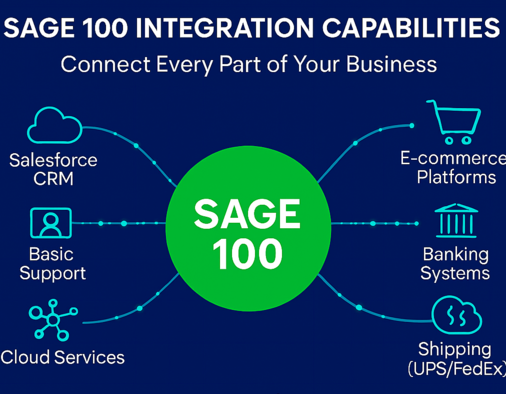
Sage Data Exchange (SDE) Technology
SDE serves as the foundation for many Sage 100 integrations, enabling both real-time and scheduled data synchronization. This technology allows developers to:
- Create custom web applications that access live Sage 100 data
- Develop mobile interfaces for field service or sales teams
- Build automated data exchange processes with external systems
- Implement real-time dashboards and reporting tools
The flexibility of SDE technology means virtually any integration scenario can be addressed with the right development expertise.
Sage 100 Developer Expertise
When evaluating potential Sage 100 developers, experience and track record are critical factors that directly impact project success. Premier development firms bring decades of specialized expertise to every engagement.
Industry-Leading Experience Metrics
The most established Sage 100 development partners demonstrate:
Longevity in the Sage Ecosystem: Look for developers with 20+ years of experience, dating back to the original MAS 90/200 systems. This historical knowledge proves invaluable when working with companies that have upgraded through multiple Sage versions.
Team Expertise Depth: Combined team experience of 100+ years indicates a firm with diverse skills and the ability to handle complex projects. This depth ensures you're not dependent on a single developer's knowledge.
Proven Implementation Track Record: Developers who have completed 200+ client implementations bring tested methodologies and best practices to your project. They've encountered and solved the challenges you're likely to face.
Continuous Certification Maintenance: Annual recertification requirements mean truly committed developers invest in ongoing training to stay current with Sage 100 updates and new development techniques.
Specialized Industry Knowledge
Top-tier Sage 100 developers understand that effective customization requires more than technical skills. They bring combined expertise in:
Accounting and Financial Management: CPA-level understanding ensures customizations align with accounting best practices and maintain data integrity. This expertise proves essential when modifying financial modules or creating custom reports.
Industry-Specific Requirements: Whether you're in distribution, manufacturing, or professional services, experienced developers understand your unique challenges and compliance requirements.
Business Process Optimization: Beyond technical implementation, skilled developers identify opportunities to streamline workflows and eliminate inefficiencies through smart automation.
Change Management: Understanding how to implement new systems while minimizing disruption to daily operations ensures successful adoption of custom enhancements.
For more information about how we can tailor our solutions per industry, visit our dedicated industry pages like our Manufacturing or Wholesale & Distribution page. You can find the other industries we serve via our menu.
Choosing the Right Sage 100 Developer Partner
Selecting the appropriate development partner is perhaps the most crucial decision in your customization journey. The right choice ensures project success, while the wrong partner can lead to costly failures and system instability.
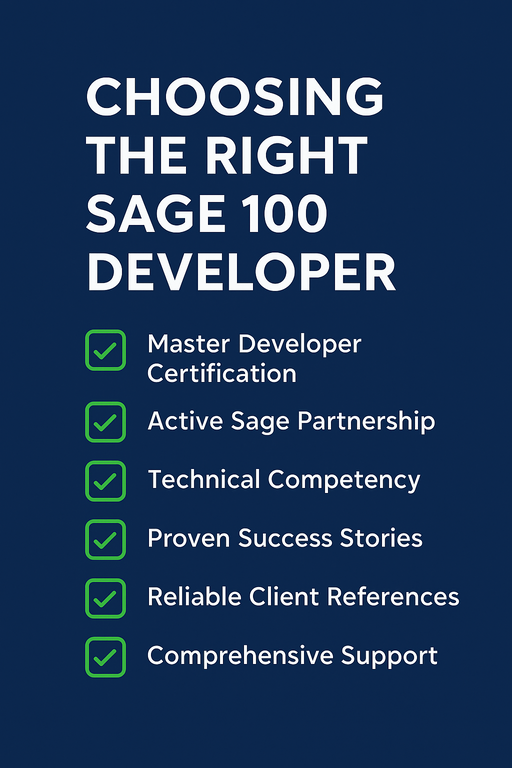
Essential Certification Verification
Before engaging any developer, verify these fundamental qualifications:
Current Master Developer Status: Request documentation proving current certification. Be wary of firms claiming past certification without current credentials—Sage software requirements change, and only active certifications ensure up-to-date expertise.
Authorized Sage Partnership: Verify the developer maintains an active partnership with Sage. This relationship provides access to latest updates, support resources, and ensures they operate with Sage's endorsement.
Technical Competency Validation: Ask specific questions about their development approach, tools used, and how they ensure upgrade compatibility. Qualified developers will provide detailed, technical responses that demonstrate genuine expertise.
Evaluating Track Record and References
Documented Success Stories: Request detailed case studies showing specific problems solved, solutions implemented, and measurable results achieved. For example Fayman Group USA's $50,000 annual savings through custom KPI reporting exemplifies the concrete results you should expect.
Current Client References: Speak directly with businesses similar to yours. Ask about project management, problem resolution, and ongoing support quality. Long-term client relationships indicate reliable partnership.
Industry Recognition: Awards from Sage software, partner accolades, and industry certifications provide third-party validation of expertise and service quality.
Portfolio Diversity: Developers with experience across multiple industries bring broader perspective and innovative solutions from other sectors that might benefit your business.
Support and Maintenance Commitment
Quality developers provide comprehensive support beyond initial implementation:
Structured Maintenance Agreements: Look for clear service level agreements, defined response times, and transparent pricing for ongoing support.
Proactive System Monitoring: The best partners monitor your customizations for potential issues and proactively address problems before they impact operations.
Upgrade Support Services: As Sage 100 evolves, your customizations need attention. Ensure your developer commits to maintaining compatibility through version updates.
Knowledge Transfer Programs: Professional developers document their work thoroughly and train your staff, ensuring you're not entirely dependent on external support.
Sage 100 Custom Development Process
Professional Sage 100 development follows established methodologies that ensure successful outcomes while minimizing business disruption. Understanding this process helps set appropriate expectations and ensures smooth project execution.
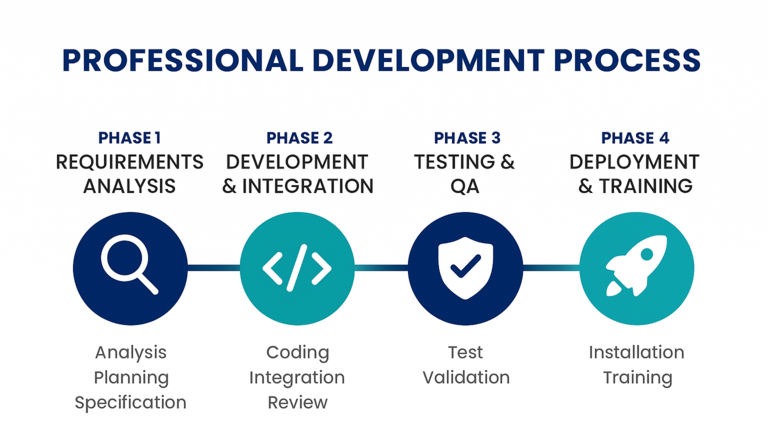
Phase 1: Comprehensive Requirements Analysis
Every successful project begins with a thorough understanding of your business:
Current State Assessment: Experienced developers start by documenting existing workflows, identifying pain points, and understanding why current processes evolved. This historical context often reveals important business rules that must be preserved.
Future State Design: Working collaboratively with your team, developers design optimized processes that leverage technology to eliminate manual work and improve accuracy.
Gap Analysis Documentation: Detailed documentation identifies specific customizations required to bridge the gap between current and desired states. This becomes the project roadmap.
Risk Assessment and Mitigation: Professional developers identify potential challenges early and develop mitigation strategies, ensuring smooth implementation.
Phase 2: Development and Integration
With requirements clearly defined, the technical work begins:
Environment Setup: Developers create isolated development environments that mirror your production system, ensuring all testing occurs without risking live data.
Iterative Development Process: Rather than delivering everything at once, experienced developers use iterative approaches that allow for feedback and refinement throughout the project.
Native Integration Methods: Custom modules should operate as an integral part of Sage 100, not as bolt-on additions. This requires deep understanding of Sage 100 architecture and adherence to development standards.
Performance Optimization: Throughout development, professionals monitor system performance to ensure customizations enhance rather than degrade overall system speed.
Phase 3: Quality Assurance and Testing
Rigorous testing procedures protect your business from costly disruptions:
Unit Testing: Individual components undergo thorough testing to ensure they function correctly in isolation.
Integration Testing: Developers verify that customizations work properly with existing Sage 100 functions and any other integrated systems.
User Acceptance Testing (UAT): Your team validates that delivered functionality meets business requirements and operates intuitively.
Performance and Load Testing: Customizations undergo stress testing to ensure they maintain performance under peak usage conditions.
Phase 4: Deployment and Training
Successful implementation requires careful planning and comprehensive user preparation:
Deployment Planning: Developers work with your team to schedule implementation during minimal business impact periods, with detailed rollback procedures if issues arise.
Administrator Training: IT staff receive technical training on maintaining and troubleshooting custom functions.
End-User Training Programs: Role-specific training ensures all users understand new capabilities and can leverage them effectively.
Documentation Delivery: Comprehensive documentation includes technical specifications, user guides, and troubleshooting procedures.
Real-World Results & Quantifiable ROI
The value of professional Sage 100 development is best demonstrated through actual business improvements achieved by companies like yours.
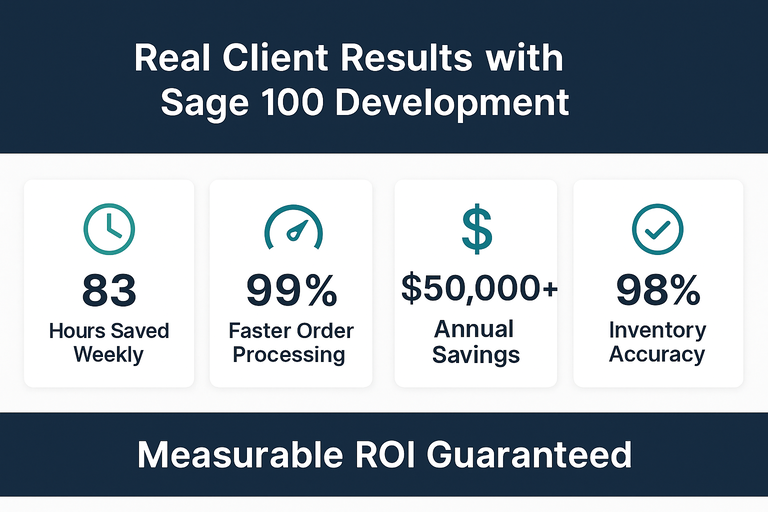
Financial Process Transformation
Companies implementing custom financial modules report dramatic improvements:
Automated Invoice Processing: A distribution company reduced invoice processing time from 30 minutes to 5 minutes per invoice through custom automation. With 200 invoices daily, this saves 83 hours per week—over two full-time positions.
Multi-Company Consolidation: Organizations with multiple entities achieve 75% faster month-end closes through automated consolidation and elimination entries. Real-time financial visibility across all companies enables better decision-making.
Cash Flow Optimization: Custom credit management and collection modules help businesses reduce DSO (Days Sales Outstanding) by 15-20%, significantly improving cash flow.
Operational Efficiency Gains
Inventory Accuracy Improvements: Multi-bin warehousing and cycle counting customizations improve inventory accuracy from typical 85% to over 98%, reducing write-offs and improving customer satisfaction.
Order Processing Speed: Automated order entry and fulfillment processes reduce processing time by 80% or more while virtually eliminating data entry errors.
Labor Cost Reductions: Automation of routine tasks allows existing staff to handle 40-50% more volume without additional hires, directly impacting profitability.
Customer Service Enhancements
Custom development dramatically improves customer experience:
Order Visibility: Customer portals integrated with Sage 100 provide real-time order status, reducing customer service inquiries by 60%.
Faster Response Times: Integrated CRM and service modules ensure customer service representatives have complete information instantly available, resolving issues 40% faster.
Proactive Communication: Automated notifications for order status, shipping updates, and account information keep customers informed without manual intervention.
Integration and API Development Deep Dive
Modern business operations demand seamless connectivity between systems. Sage 100 developers create sophisticated integrations that eliminate data silos and automate cross-platform processes.
E-commerce Integration Excellence
The growth of online sales makes Sage 100 e-commerce integration increasingly critical:
Real-Time Inventory Synchronization: Prevent overselling with instant inventory updates across all sales channels. Custom integrations ensure available quantity reflects current stock levels, pending orders, and allocated inventory.
Automated Order Processing: Orders flow directly from your website into Sage 100, automatically checking credit limits, calculating taxes, and determining shipping costs. This automation reduces order processing time by up to 95%.
Customer Account Management: Synchronize customer data, order history, and account status between systems. Customers can check order status, view invoices, and make payments online while all data updates in Sage 100.
Dynamic Pricing Updates: Special pricing, quantity breaks, and promotional offers automatically synchronize from Sage 100 to your e-commerce platform, ensuring pricing accuracy across channels.
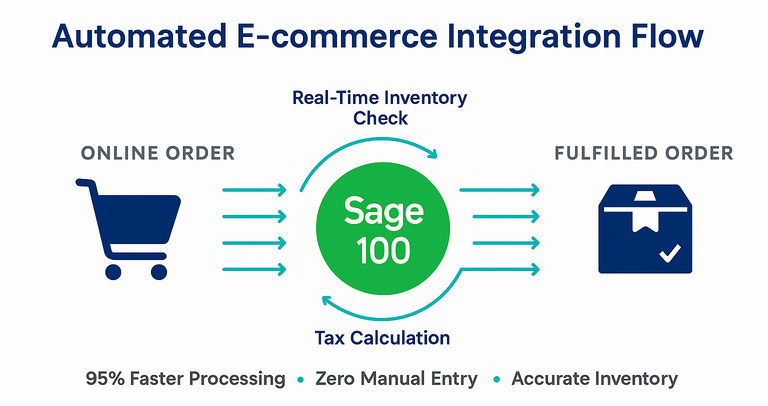
EDI Integration Solutions
Electronic Data Interchange remains crucial for many industries, and custom EDI integration eliminates manual processing:
Automated Document Exchange: Custom EDI solutions automatically process purchase orders, invoices, advance ship notices, and other documents without manual intervention.
Trading Partner Compliance: Meet specific requirements from major retailers and distributors with customized document mapping and validation rules.
Error Handling and Notifications: Intelligent error detection and correction mechanisms ensure smooth document flow while alerting staff to exceptions requiring attention.
Cost Reduction: Eliminate per-transaction fees charged by EDI service providers while gaining complete control over your EDI processes. Pajunk eliminated 40+ hours of weekly manual processing through custom EDI integration.
Custom API Development
For unique integration requirements, developers create custom APIs that enable:
Mobile Application Support: Field sales and service teams access real-time Sage 100 data through custom mobile applications, enabling order entry, inventory checks, and customer account management from anywhere.
Cloud Platform Integration: Connect Sage 100 with cloud based platform services for enhanced functionality, from advanced analytics to AI-powered demand forecasting.
IoT Device Connectivity: Manufacturing and warehouse operations benefit from direct integration with sensors, scales, and other devices that feed data directly into Sage 100.
Partner System Integration: Create secure APIs that allow suppliers, customers, or other partners to exchange data with your Sage 100 system while maintaining complete control over access and permissions.
Investment Considerations and ROI Planning
Understanding the investment required for Sage 100 custom development helps businesses plan effectively and set realistic expectations for their enhancement projects.
Factors Influencing Project Investment
Several variables impact development costs and timelines:
Complexity of Requirements: Simple report modifications require minimal investment, while comprehensive system integrations demand more resources. Be specific about your needs to receive accurate project estimates.
Number of Integration Points: Each system connection requires analysis, development, and testing. Projects involving multiple integrations naturally require larger investments but often deliver proportionally greater returns.
Data Migration Scope: Converting historical data from legacy systems adds complexity. The volume and condition of existing data significantly impact project timelines and costs.
User Training Requirements: Organizations with many users or multiple locations need comprehensive training programs. Factor in the cost of temporary productivity decreases during the learning curve.
Ongoing Support Needs: While initial development represents the largest investment, budget for ongoing maintenance, updates, and enhancements as your business grows.
Typical ROI Achievement Timelines
Most Sage 100 development projects achieve positive ROI within predictable timeframes:
Quick Wins (3-6 months): Simple automations like report generation, basic integrations, or workflow improvements often pay for themselves within months through labor savings alone.
Moderate Projects (6-12 months): E-commerce integrations, EDI implementations, and multi-location inventory solutions typically achieve full payback within a year while delivering ongoing benefits.
Comprehensive Transformations (12-24 months): Large-scale projects involving multiple integrations, extensive customization, and significant process changes take longer to fully realize ROI but deliver the most substantial long-term value.
Cumulative Benefits: Unlike one-time cost reductions, custom development benefits compound over time. Efficiency gains, error reductions, and improved decision-making continue delivering value long after initial payback.
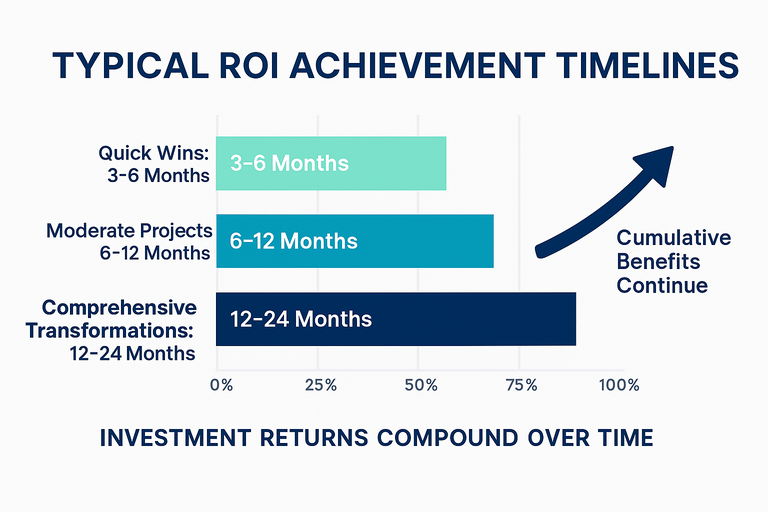
Maximizing Your Sage 100 Investment
Professional developers help maximize ROI through:
Phased Implementation Approaches: Breaking large projects into phases allows earlier realization of benefits while spreading investment over time.
Focus on High-Impact Areas: Experienced developers identify customizations offering the greatest return, prioritizing development efforts accordingly.
Scalability Planning: Well-designed customizations grow with your business, avoiding the need for costly redesigns as operations expand.
Knowledge Transfer: Ensuring your team can maintain and extend customizations reduces long-term support costs while increasing value realization.
Future-Proofing Sage 100
Technology continues to evolve rapidly, and your Sage 100 customizations must be designed to adapt to changing business needs and platform updates.
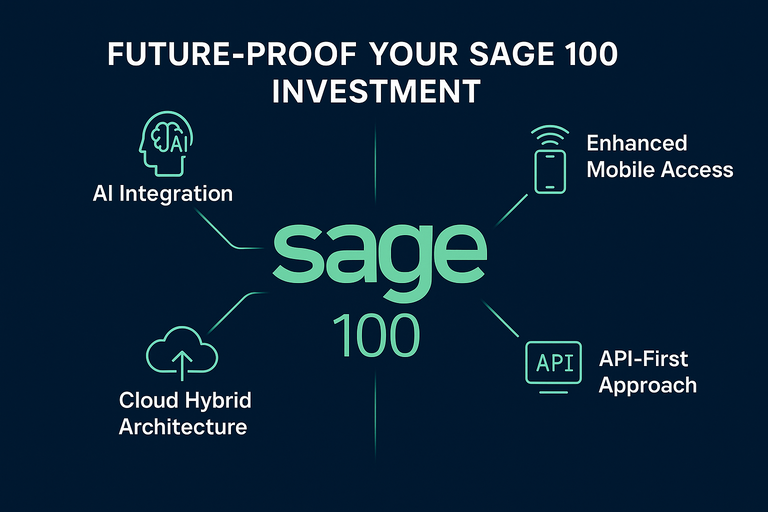
Emerging Technology Trends
Artificial Intelligence Integration: AI-powered analytics, demand forecasting, and process automation increasingly augment traditional ERP functions. Forward-thinking developers prepare for these integrations.
Enhanced Mobile Capabilities: The mobile workforce demands comprehensive access to ERP functions. Modern customizations consider mobile-first design principles.
Cloud Hybrid Architectures: While Sage 100 remains primarily on-premise, integration with cloud services for analytics, backup, and extended functionality becomes increasingly important.
API-First Development: The proliferation of specialized business applications demands robust API strategies that enable easy future integrations.
Ensuring Upgrade Compatibility
Adherence to Sage Standards: Following official Sage development guidelines ensures customizations remain compatible with platform updates.
Modular Architecture Design: Well-structured customizations isolate functionality, making updates and modifications easier while reducing upgrade risks.
Comprehensive Documentation: Detailed technical documentation enables future developers to understand and maintain customizations, protecting against knowledge loss.
Regular Compatibility Testing: Proactive testing with new Sage 100 versions identifies potential issues before they impact production systems.
Planning for Business Growth
Scalable customizations accommodate business expansion:
Multi-Company Architecture: Even single-entity businesses benefit from customizations designed to support future acquisitions or divisions.
Volume Scalability: Ensure customizations maintain performance as transaction volumes grow with your business success.
Feature Extensibility: Modular design allows adding new features without redesigning existing customizations.
Integration Flexibility: Open architectures facilitate adding new systems and platforms as your technology stack evolves.
The Kissinger Associates Advantage
When selecting a Sage 100 developer, experience, certification, and proven results matter. Kissinger Associates brings unique advantages to every client engagement:
Unmatched Master Developer Heritage
As a master developer since 1989, Kissinger Associates offers:
- Continuous Certification: Over 35 years maintaining the highest Sage standards without interruption
- Source Code Access: Exclusive ability to create deep customizations unavailable to standard developers
- Pre-Built Solutions: Library of proven enhancements ready for implementation
- Direct Sage Relationship: Strong partnership ensures early access to updates and priority support
Comprehensive Service Capabilities
Beyond basic development, Kissinger Associates provides:
- Full-Service ERP Consulting: From selection through implementation and ongoing support
- Industry-Specific Solutions: Specialized expertise in manufacturing, distribution, and service industries
- Integrated Service Offerings: Complementary e-commerce consulting and EDI integration services
- Business Process Expertise: CPA-level accounting knowledge combined with technical skills
Proven Client Success
With thousands of successful client implementations, Kissinger Associates delivers:
- Quantifiable Results: Documented ROI ranging from $40,000 to over $100,000 annually
- Long-Term Partnerships: Many clients have relied on their expertise for over a decade
- Industry Recognition: Multiple excellence awards from Sage software
- 98.8% Client Satisfaction: Exceptional satisfaction ratings demonstrate consistent delivery
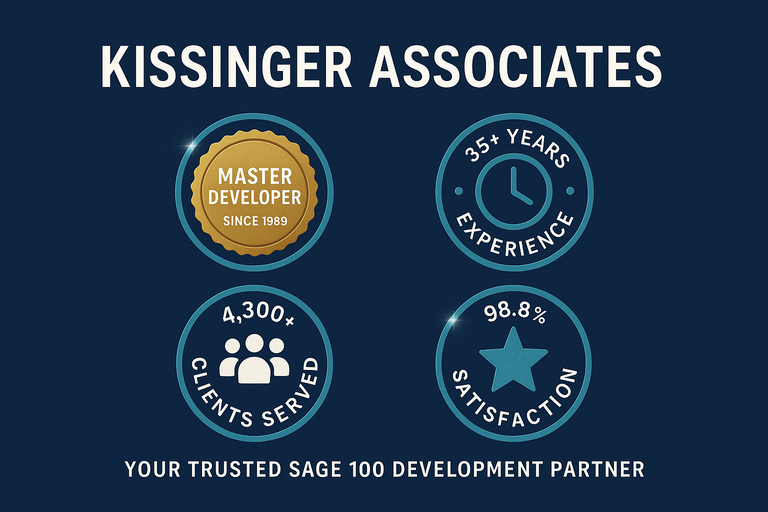
Take Action: Elevate Your Sage 100 System Today
Your Sage 100 system holds untapped potential that professional custom development can unlock. Whether you need to automate manual processes, integrate with other systems, or create entirely new functionality, the right developer partner makes transformation possible.
The difference between struggling with software limitations and leveraging technology for competitive advantage comes down to choosing the right Sage 100 developer. With master developer certification, decades of proven experience, and a track record of delivering measurable results, you can confidently invest in customizations that drive real business value.
Don't let another day pass with inefficient processes, manual workarounds, or missed opportunities. Professional Sage 100 development pays for itself through improved efficiency, reduced errors, and better decision-making capabilities.
Ready to explore what custom development can do for your business? Contact Kissinger Associates today for a comprehensive assessment of your Sage 100 system. Our team will evaluate your current setup, identify automation opportunities, and provide a detailed roadmap for achieving your business objectives through proven custom development solutions.
Transform your Sage 100 investment from a basic accounting system into a powerful business automation platform. The journey to increased efficiency, improved profitability, and competitive advantage starts with a single conversation.







